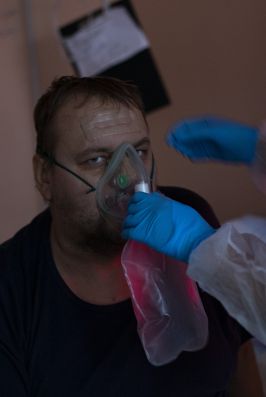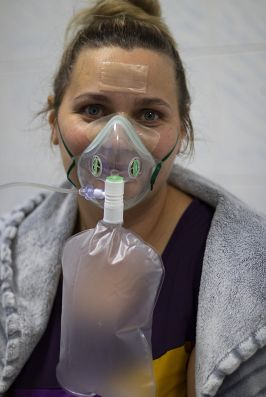“I think that only the fear of dying has kept me alive. I wanted to live. I was doing everything that I could to breathe."
On the COVID wing of Hospital 4 in Kyiv, more than a dozen of the city's sickest patients fight for their lives.
The noise from the oxygen machines is omnipresent and only drowned out by the coughs.
But, amid all ominous sounds, there is hope. Sergey Rudenko tells Euronews he's over the worst of COVID-19, which has kept him in hospital for nearly a month.
“Right now, I am better,” says Rudenko, 41, often interrupting his sentences to cough. “I think that only the fear of dying has kept me alive. I wanted to live. I was doing everything that I could to breathe. I am better now, but it was always a mixture of fear, pain, and panic before. Everything was hurting all the time. A syringe fed me.
“I just tried to sleep. To escape the pain and the fear. Sleep, sleep and sleep,” he adds, breathing through an oxygen mask. “For three days, I didn’t get up at all. My eyes must have been cloudy because I remember that the nurses are shaking me, asking if I could still hear them. After that, I was just a vegetable.”
Ukraine is in the eye of a COVID storm. On Tuesday, it registered a record 838 deaths from the disease, the second-biggest daily tally in the world after Russia.
It comes as authorities struggle to convince Ukrainians to get vaccinated. Only a fifth of the population is fully jabbed.
Rudenko was unvaccinated, something he regrets now.
“People are not told that if you get sick, it will be so easier for you if you are vaccinated and that you escape this horror,” says Rudenko, who has a wife and two sons waiting for him at home.
“Now, I am already sick and have felt how it is. I understand. If I knew that before, I would have been vaccinated.
“But I can’t do anything about that now. I am in this place and can’t go anywhere. Every day, my children draw pictures for me, and I get letters of support from my family. I spend my time reading them and dreaming of going home.”
'The situation is getting better'
In a bid to contain the COVID surge, regional lockdowns targeting the unvaccinated have been introduced.
In Kyiv, people without proof of vaccination are not allowed to use public transportation or visit restaurants.
Ukraine's deputy health minister, Ihor Kuzin, claims the health situation is now improving.
“At this moment, Ukraine is in a complicated epidemiological situation. We are not in denial of that… (but) in Ukraine for the past week or week and a half, I think there are stabilisation signs,” says Kuzin, pointing out that more people are currently recovering from COVID than getting sick.
He admits the situation remains critical and says deaths will increase before low infection numbers are reflected in fewer people in hospitals. Kuzin adds strict quarantine plays a crucial role in getting the situation under control.
“I believe that in the nearest one or two weeks we could really be able to see the situation stabilise fully,” he said. “We see that those regions that are actually fulfilling all of their requirements… in the red zone, they're starting to get stabilisation of the situation or even the decline on the curve.”
The next step, he says, is to get more people vaccinated.
'No one is vaccinated at this hospital'
Back at Hospital 4 in Kyiv, 30-year-old doctor Anita Godun shows Euronews around. She says not every doctor expected Rudenko to survive, given his severe condition, weight problems and other underlying conditions.
Godun says the situation at the hospital is worse than at any point during the pandemic.
“This year is much different from last year, patients get sick much faster and more severe,” she says, pointing to the new variants as an explanation.
“It used to take two to three weeks until people got really bad, now it takes no more than seven to ten days.
"We now see also young people die even without any underlying condition.”
Godun says that while the number of infections is stabilising in Ukraine, they haven’t felt that at the hospital yet. She hopes that Rudenko will be strong enough to go home in a couple of weeks and make room for a new patient.
“We lost a 34-year-old lady last Friday," she continued "She was very young and had no other conditions that we knew of. We couldn’t help her. Her lungs couldn’t breathe anymore, and it is so terrible when they lose someone so young.
“None of the patients here now are vaccinated. We have had a couple, who had received one dose, but they are better off than the ones without any. So we can clearly see that while you can still catch the virus being vaccinated, your illness will be less severe, and for many, it is just like the flu.”
The stick or the carrot?
Recently, the Ukrainian government decided that all government employees and people working at nurseries, schools, and universities will need to be vaccinated if they want to come to work during the current quarantine period.
The move was met with demonstrations.
But the restrictions, combined with a surge of infections, has pushed Ukrainians to get vaccinated. The number of daily jabs has increased to 300,000 a day.
Nevertheless, polls still show around 50 per cent of Ukrainians are still against being inoculated.
“The fact is, and it is really frightening, a big pile of people are not willing to be vaccinated," said Kuzin. "Some do not trust the quality of vaccines, and some do not trust the government. We have the highest number of people who do not want to get vaccinated. Even higher than in Russia, I think.”
He says that the government, on one side, is informing about the benefits of vaccinations and, on the other side, is ready to expand the list of employees who are required to be vaccinated to also include people working in state-owned companies.
“We want to fully vaccinate 15 million people by the end of the year,” he said, adding that Ukraine would like to inoculate 70 per cent of its population by the end of next year.
'I didn’t believe it would be so bad'
Back at Hospital 4, Euronews met Natalia Kazachkivska who had been at the facility for around a week. She didn’t get vaccinated because she was breastfeeding her 11-month-old son and thought COVID could not be bad for someone as young as her.
“I was one of the people who didn’t really believe it in, that Covid could be so bad,” said the 34-year-old. “But I do now.
“I didn’t come to the hospital until I almost lost consciousness and had such a high fever that I couldn’t bring it down even with medicine
“The doctors here saved me. I feel better now and hope to leave soon, but the situation was horrible before.”
She shows pictures drawn by her older seven-year-old son. In one, he has drawn a big heart.
“I just hope to get out of here very, very quickly,” said Kazachkivska, breathing through an oxygen mask.
Every weekday at 1900 CET, Uncovering Europe brings you a European story that goes beyond the headlines. Download the Euronews app to get an alert for this and other breaking news. It's available on Apple and Android devices.













